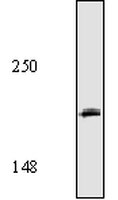NB20 Sigma-AldrichAnti-AnkyrinG Mouse mAb (463)
Anti-Ankyrin G, mouse monoclonal, clone 463, recognizes the ~190 kDa ankyrin G protein in brain extracts. It is validated for Western blotting, immunofluorescence, and frozen sections.
More>> Anti-Ankyrin G, mouse monoclonal, clone 463, recognizes the ~190 kDa ankyrin G protein in brain extracts. It is validated for Western blotting, immunofluorescence, and frozen sections. Less<<Anti-AnkyrinG Mouse mAb (463) MSDS (material safety data sheet) or SDS, CoA and CoQ, dossiers, brochures and other available documents.
Recommended Products
概述
| Replacement Information |
|---|
重要规格表
| Species Reactivity | Host | Antibody Type |
|---|---|---|
| Ca, H, M, R | M | Monoclonal Antibody |
价格及供货情况
| 产品目录编号 | 库存情况 | 包装 | 数量 / 包装 | 价格 | 数量 | |
|---|---|---|---|---|---|---|
| NB20-100UGCN |
|
塑胶安瓿;塑胶针药瓶 | 100 μg |
|
— |
| Description | |
|---|---|
| Overview | Recognizes the ~190 kDa ankyrinG protein in brain extracts. Reacts with all spliced forms of ankyrinG.
|
| Catalogue Number | NB20 |
| Brand Family | Calbiochem® |
| Application Data |  Detection of mouse AnkyrinG by immunoblotting. Sample: Whole tissue extract from mouse brain. Primary antibody: Anti-AnkyrinG Mouse mAb (463) (Cat. No. NB20) (2 µg/ml) Detection: chemiluminescence. |
| Product Information | |
|---|---|
| Form | Liquid |
| Formulation | In 50 mM sodium phosphate buffer, 0.2% gelatin, pH 7.5. |
| Positive control | Mouse or rat brain extract or unmyelinated axons |
| Preservative | ≤0.1% sodium azide |
| Quality Level | MQ100 |
| Physicochemical Information |
|---|
| Dimensions |
|---|
| Materials Information |
|---|
| Toxicological Information |
|---|
| Safety Information according to GHS |
|---|
| Safety Information |
|---|
| Product Usage Statements |
|---|
| Storage and Shipping Information | |
|---|---|
| Ship Code | Blue Ice Only |
| Toxicity | Standard Handling |
| Storage | +2°C to +8°C |
| Do not freeze | Yes |
| Packaging Information |
|---|
| Transport Information |
|---|
| Supplemental Information |
|---|
| Specifications |
|---|
| Global Trade Item Number | |
|---|---|
| 产品目录编号 | GTIN |
| NB20-100UGCN | 04055977209808 |
Documentation
Anti-AnkyrinG Mouse mAb (463) MSDS
| 职位 |
|---|
Anti-AnkyrinG Mouse mAb (463) 分析证书
| 标题 | 批号 |
|---|---|
| NB20 |
参考
| 参考信息概述 |
|---|
| Davis, J.Q., et al. 1995. Mol. Biol. Cell 6, 177a, supplement. Kunimoto, M., et al. 1995. FEBS Lett. 357, 217. Lambert, S., et al. 1995. Mol. Biol. Cell 6, 98a supplement. Bennett, V. and Gilligan, D.M. 1993. Ann. Rev. Cell Biol. 9, 27. Kunimoto, M., et al. 1991. J. Cell Biol. 115, 1319. Otto, E., et al. 1991. J. Cell Biol. 114, 241. Davis, J., and Bennett, V. 1984. J. Biol. Chem. 259, 13550. |







